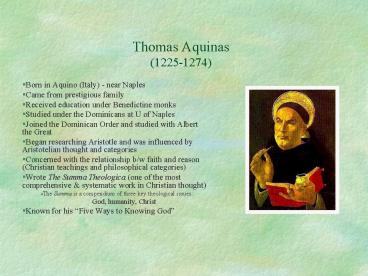Thomas Aquinas 12251274 - PowerPoint PPT Presentation
1 / 9
Title:
Thomas Aquinas 12251274
Description:
Received education under Benedictine monks. Studied under the Dominicans at U of Naples ... Began researching Aristotle and was influenced by Aristotelian ... – PowerPoint PPT presentation
Number of Views:309
Avg rating:3.0/5.0
Title: Thomas Aquinas 12251274
1
Thomas Aquinas(1225-1274)
- Born in Aquino (Italy) - near Naples
- Came from prestigious family
- Received education under Benedictine monks
- Studied under the Dominicans at U of Naples
- Joined the Dominican Order and studied with
Albert the Great - Began researching Aristotle and was influenced by
Aristotelian thought and categories - Concerned with the relationship b/w faith and
reason (Christian teachings and philosophical
categories) - Wrote The Summa Theologica (one of the most
comprehensive systematic work in Christian
thought) - The Summa is a compendium of three key
theological issues - God, humanity, Christ
- Known for his Five Ways to Knowing God
2
Terminology
- Potentiality and actuality
- All things by their nature have a goal an end, an
aim - All things by their nature have potentiality
(possibility, contigency) - matter itself has no form (shape), but it has the
potential to take on any form - Bronze Statue the bronze is the matter, the
shape is the form the shape is what makes the
bronze into an actual statue - The mind has the potential to grasp the essence
of things - Essence and Existence
- essence is what a thing is (its nature)
existence is that a thing is (that it exists)
3
Epistemology (theory of knowledge and truth)
- begin with sense experience and observation
particular - knowledge
- use reason grasp universals, general ideas,
essences - no innate ideas, only capacity for abstraction
Question How does knowledge move from sensation
and particular knowledge to general ideas?
Active intellect illumines the image of a
particular object and produces an impression
Passive intellect has an impression of that
particular object
The intellect passes judgment on the object and
it is true as much as it conforms to the mind and
the thing
4
Human nature and truth
- In knowledge the knower becomes the known by
mental (or spiritual) assimilation without
ceasing to be himself - A natural inclination to the truth and to love
(i.e., desire of the good) - Complete love was the fruit of complete knowledge
- When the person loves the thing then the person
has true knowledge of the thing
5
Knowledge of God
- How do we have knowledge of God?
- Knowledge is actively directed towards all
being - Things are known insofar as they are in act
(participate in being) - Potentia obedientialis the ability to grasp
the supreme good (i.e., being or God) - We ultimately can only know that God exists with
our reason, we need revelation to tell us about
God
6
The Five ways to know God
- Theory of causation every effect has a cause
- Thomas framework is hierarchical (subordinate
member is causally dependent on a supreme member)
not chronological (not an ordered series
stretching back into the past) - E.j. the activity of your pen is subordinate to
the activity of your hand
7
(No Transcript)
8
PLATO
ARISTOTLE
AUGUSTINE
THOMAS AQUINAS
9
Why is this important for theology?
- It points to the idea that science and religion
(faith and reason) are not mutually exclusive































